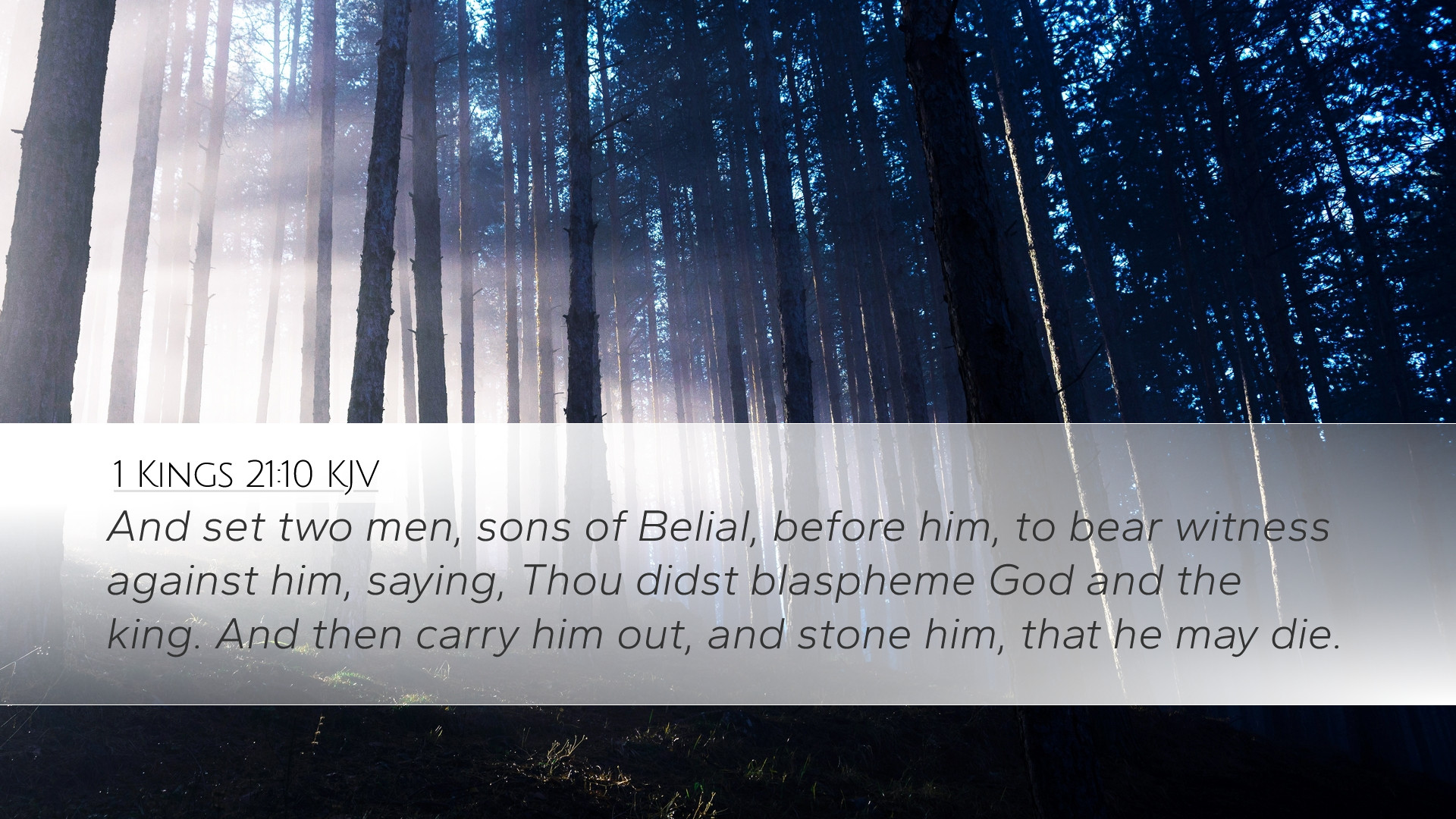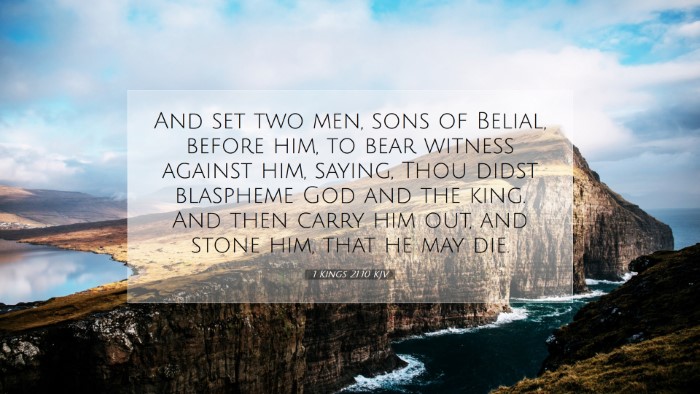Commentary on 1 Kings 21:10
Introduction
The story surrounding the verse 1 Kings 21:10 presents a vivid picture of injustice, covetousness, and the moral decay of leadership. It is pivotal due to its implications on kingship, prophecy, and divine judgment. In this analysis, insights from Matthew Henry, Albert Barnes, and Adam Clarke are synthesized, offering depth for pastors, students, theologians, and scholars.
Context of 1 Kings 21
1 Kings 21 depicts the account of King Ahab’s desire for Naboth’s vineyard. This narrative serves as a cornerstone for understanding the moral and spiritual decay evident in Israel's monarchy. Pursuing personal desires at the expense of justice and righteousness is the central theme of this passage.
Verse Analysis
1 Kings 21:10 (KJV): "And set two men, sons of Belial, before him, to bear witness against him, saying, 'Thou didst blaspheme God and the king.' And then carry him out, and stone him, that he may die."
Matthew Henry's Insights
Matthew Henry emphasizes the malignancy of Ahab’s heart and the depths of his depravity. He notes that Ahab, unable to possess Naboth's vineyard through honorable means, resorted to malicious and deceitful tactics:
- Corruption of Justice: Ahab's use of "sons of Belial" highlights how wickedness infiltrated the judicial system. These false witnesses were instrumental in fabricating charges against Naboth, thus perverting justice.
- Witnessing Against the Innocent: The act of bearing false witness is a severe communal sin in scripture, showcasing how leaders can manipulate social structures for selfish gain.
- Divine Retribution: Henry argues that the narrative serves as a reminder of God's watchful eye, suggesting that while evil may momentarily prevail, divine retribution is inevitable.
Albert Barnes's Commentary
Albert Barnes expands on the implications of this verse within the broader narrative of Ahab's reign. He highlights several critical observations:
- Character of Ahab: Ahab's character is marred by jealousy and greed, illustrating the destructive effects of unchecked desire. His prioritization of personal gain over moral integrity is a cautionary tale.
- Role of False Accusation: Barnes notes that the orchestrated false witness underscores the ease with which leaders can corrupt justice. The phrase "sons of Belial" denotes these witnesses’ absolute moral depravity, intentionally chosen to fulfill Ahab's sinister plot.
- Divine Judgment: Barnes notes that Naboth’s unjust execution was not merely a local crime, but a gross violation that called down God’s judgment upon Ahab and Israel.
Adam Clarke's Observations
Adam Clarke provides a theological perspective on the events, shedding light on the broader moral and spiritual consequences:
- Theological Implications: Clarke emphasizes the importance of personal integrity for leaders. Ahab’s actions serve as a critical examination of moral decay within religious and political domains.
- Symbolism of the Vineyard: The vineyard symbolizes not just property but the inheritance of God’s people. Naboth’s refusal to sell represents obedience to God’s commandments, contrasting sharply with Ahab’s desires.
- Sin’s Progression: Clarke indicates that the progression of sin begins with desire and ends in death, both physically and spiritually, illustrating how sin can corrupt not only individuals but entire nations.
Lessons for Contemporary Readers
The narrative of Ahab and Naboth provides timeless lessons relevant to contemporary society:
- The Importance of Justice: Justice must be upheld in all areas of authority. Leaders are called to govern fairly, ensuring that personal desires do not cloud their judgment.
- The Dangers of Covetousness: The longing for what belongs to others is condemned throughout scripture. This story warns against allowing greed to dictate one’s actions.
- Faithfulness in Adversity: Naboth’s steadfastness in his faith and principles despite persecution provides an exemplary model of integrity for believers.
- Divine Justice: Ultimately, God’s justice prevails. Even when evil seems to triumph, faith assures believers that God will act justly.
Conclusion
The study of 1 Kings 21:10 encompasses profound themes of injustice, human corruption, and divine oversight. The insights of Matthew Henry, Albert Barnes, and Adam Clarke collectively urge believers to remain vigilant against moral decay and to uphold the values of justice and integrity in all circumstances. As stewards of God’s Word, it is imperative for pastors and theologians to impart these lessons, fostering a church community that mirrors the righteousness of God.


